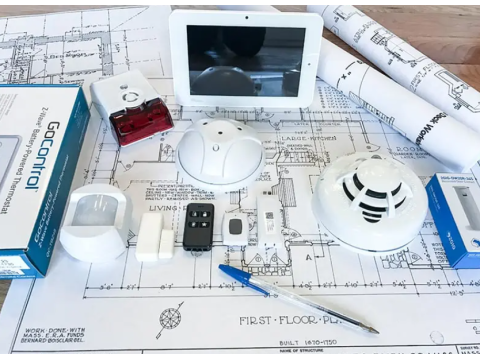Understanding Security Alarm Systems: Types and Applications
A security alarm system is a comprehensive setup of technical tools designed to detect threats to property and prevent potential damage caused by unauthorized access. It functions through automated detection and alerting mechanisms. However, it's important to distinguish between security and emergency alarm systems.
Key Differentiation: Security vs. Emergency Alarms
- Security Systems:
- Operate autonomously, detecting intrusion or tampering.
- Typically engaged during non-operational hours.
- Emergency Alarms:
- Triggered manually during active threats, such as robberies.
- Often used in banks, jewelry stores, and other high-value premises.
These systems can integrate automated triggers, such as acoustic sensors reacting to glass breakage or magnetic contacts detecting unauthorized entry.
Classification of Security Systems
Security alarm systems can be classified based on:
Purpose:
- Systems for homes, offices, banks, or warehouses.
- The complexity and equipment depend on the value of the protected assets.
Design and Components:
- Systems for securing openings:
- Magnetic Contact Sensors: For doors and windows.
- Acoustic Sensors: For detecting break-ins via sound.
- Vibration Sensors: For wall or fence tampering.
- Systems for internal monitoring:
- Infrared Sensors: Detect heat signatures in a defined area.
- Radio Wave Sensors: Monitor linear or volumetric spaces.
- Systems for securing openings:
Control and Monitoring:
- Autonomous Systems: Operate independently, suitable for homes and small businesses.
- Centralized Systems (Pultovaya): Connected to monitoring centers for rapid response.
- GSM Systems: Use mobile networks for communication with owners or monitoring centers.
Security System Architecture: Layered Protection
Security systems are often described in terms of "layered protection," particularly when linked to centralized monitoring services (Pultovaya). Each layer represents a different zone or entry point under surveillance, ensuring comprehensive coverage.
Why Choose a GSM Security System?
GSM technology enables:
- Real-time alerts via mobile devices.
- Remote management of security settings.
- Seamless integration with centralized monitoring or direct owner notification.
GSM systems are versatile and can function autonomously or as part of a larger network.
Choosing the Right System
Selecting the right security system involves assessing:
- The value of assets being protected.
- The complexity of the site layout.
- The level of required monitoring (autonomous, GSM, or centralized).
For high-value facilities like banks, advanced setups with addressable sensors and integrated monitoring systems are essential.
Conclusion
Security alarm systems range from simple residential setups to advanced commercial complexes. Proper classification and design ensure tailored solutions for different needs, maximizing safety and response efficiency. For expert advice and the latest security technologies, visit safsale.com

